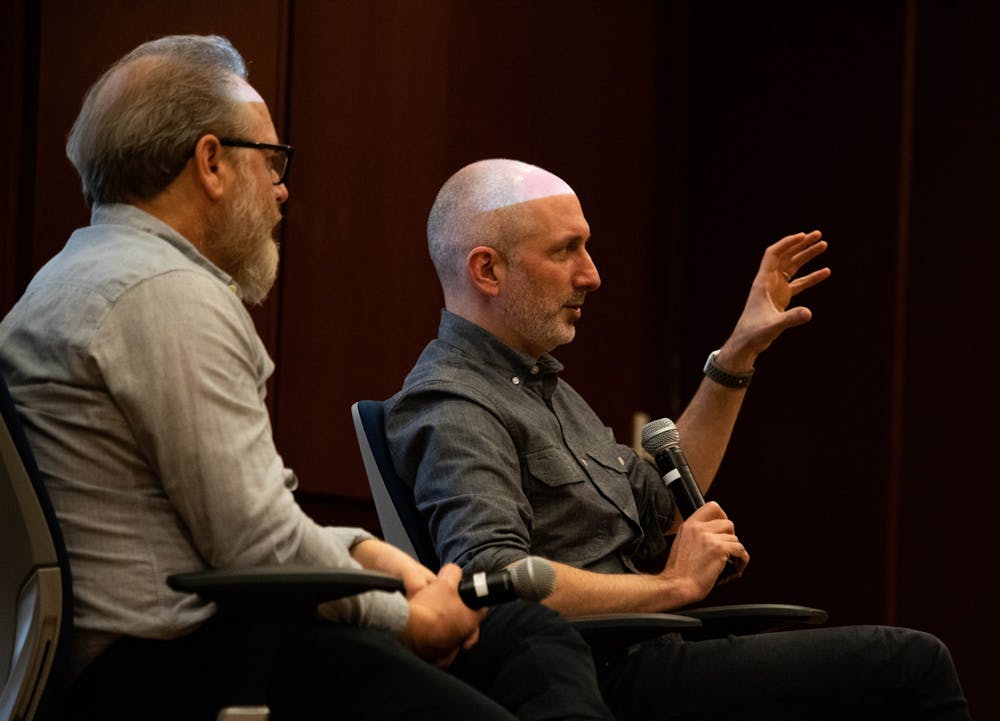Samuel Greene and Graeme Robertson, co-authors of “Putin v. The People: The Perilous Politics of a Divided Russia,” said the rest of the world’s opinions surrounding the Russian invasion of Ukraine will reach the Russian people, despite Putin closely controlling the state’s media. The pair spoke to Elon University students on Monday, Feb. 28, just a few days following the Russian invasion into Ukraine.
Greene and Robertson discussed the war in Ukraine through a series of questions and answers from students on Feb. 28 in the KOBC LaRose Digital Theater. The panel was moderated by Safia Swimelar, professor of political science. Senior Caroline Seelman, who attended the panel, said it helped catch her up because of the fast-paced events of the last week.
“It was a really enlightening discussion,” Selman said. “It was very interesting to be able to kind of have a better understanding of both perspectives.”
The panel was introduced by Elon University President Connie Book, who shared sentiments with the audience.
“In this time of confusion, frustration and fear … for many across the world who are struggling to understand how this could be happening today. A lot of people are watching these images asking themselves that very question,” Book said. “So tonight, we gather in solidarity with the people of Ukraine and others around the world who are being attacked, killed and displaced.”
How the invasion started
Greene said the internal conflicts in Russia from the collapse of the USSR in 1991 to the present invasion played a large role in starting this war. Putin felt threatened by fellow former Soviet Union countries joining NATO, Greene said, even though they joined out of fear of a Russian invasion or retaliation.
“It was a flight from Russia that motivated Poland, Hungary, Czech Republic, Slovakia and then the Baltic states, others to join NATO. And that what we're seeing now, almost justifies all of that in retrospect, but they were right to be,” Greene said. “I don't want to say that all of that is immaterial and wrong, because there were certainly people and interests in a lot of these places that did see the world that way.”
Sophomore Eli Bier said the panel cleared up his confusion about NATO’s role in the invasion.
“I thought the panel was really informative,” Bier said. “It helped me better understand the conflict, which I've been following very intently and really helped color it for me.”
According to Greene and Robertson, Russia went through changes after the breakdown of the Soviet Union, freeing the economy and the media. Once Putin came into power, however, he was concerned those changes were not in the best interest of the state.
“He saw the state as poorly dysfunctional, and he wasn't entirely wrong when he came to power in 1999,” Greene said. “And he saw the state as beset by a lot of very powerful interests, right that the way he saw it didn't have the state's interest and didn't have Russia's best interests at heart.”
Ongoing events
Greene and Robertson also discussed the precedent the war is setting, starting with how the European Union has become a leading force in implementing sanctions against Russia.
“We were expecting the Americans and the British to be leading on the sanctions and leading the effort to put together a response, since both of those governments were very public about the threat of invasion,” Robertson said. “What we've actually seen in the last few years, really in the last 40 hours is the Europeans taking the lead.”
Greene and Robertson said it was a large step for Switzerland to forgo its history of neutrality and place sanctions on Russia on Monday.
“By virtue of its membership in the European Economic Area, it would have been very difficult for them not to participate in it,” Greene said. “And the economic aspect of neutrality has always been a little iffy, really, ever since they joined the EEA but that's what we might call the hard reality.”
Robertson said that an important outcome could be the Russian state media breaking down as friends and family share the real account of events with Russian citizens.
“A possibility is that the economic impact and the stories that people hear from friends and family about what's actually happening in Ukraine kind of bursts this state media bubble and really damages his popularity,” Robertson said.
Robertson outlined the two ways he said he thinks the invasion could play out.
“There's two things you could do, you could double down, right, and really go back to the traditional war plan, which would involve enormously ramping up the violence and then do whatever post-war, or, more optimistically, they would try to find a solution that would allow them to withdraw and be able to claim something,” Robertson said.


